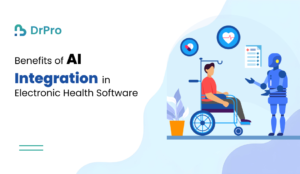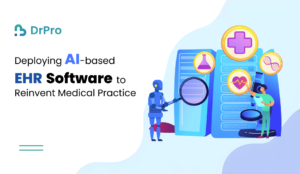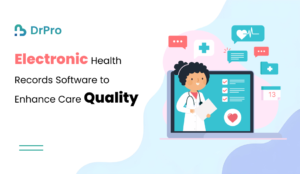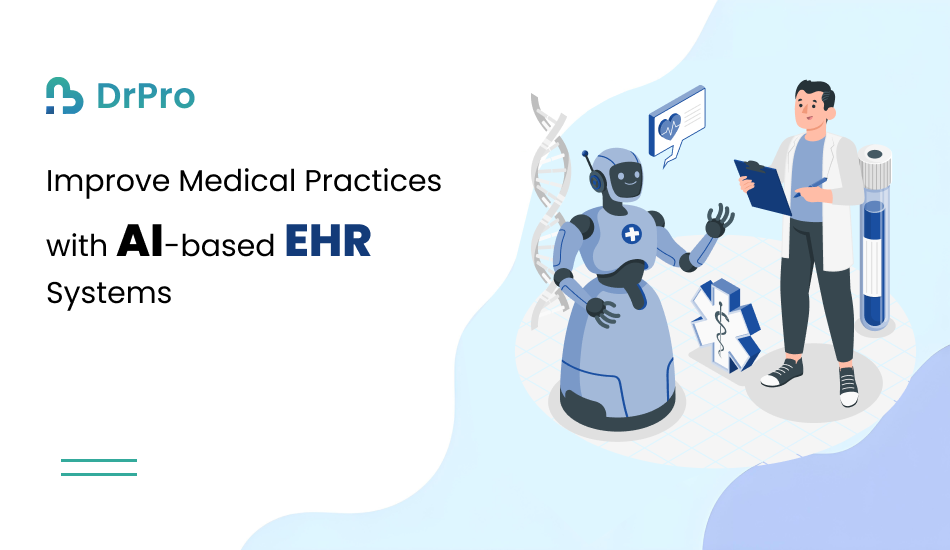In the modern world health care climate, even medical practices are not an exception to look for more effective ways to reduce time wastage, irrelevance occurrence of mistakes, and enhanced patient care. Incorporating AI-based EHR Systems is now a leading agent in revolutionary changes associated with how patient information is processed and services delivered. Intelligent EHR systems are no longer a vision for the future they are emerging as great opportunities in today’s world with multiple advantages to clinicians and patients. But again, these systems do more than manage work processes; they augment experiential knowledge, increase safety measures for patients, and facilitate individualized care to patients.
In this article, the reader will understand how integrating artificial intelligence into Electronic Health Records systems changes modern practices, how the latter can be implemented in rebuilding healthcare, and how all this contributes to improving patient outcomes. By integrating with AI, these systems are revolutionizing how doctors, nurses, and healthcare administrators manage data and, consequently quality of care provided to patients.
Benefits of AI Integration in Electronic Health Software

Such features make AI-based EHR systems offer the following advantages to medical practices: Integrating AI into traditional EHR systems provides ways to minimize time spent on manual work and improve decision-making.
Improve Clinical Workflow
Another advantage of using AI in EHR systems is that it improves clinical flow by a larger percentage. There are logistical roles that are simple and routine such as data input, appointment setting, and data record retrieval and by utilizing artificial intelligence such tools can be easily handled thereby developing time for complex tasks such as patient care. These systems can recognize immediately if any data is incomplete or if the medical staff has input something incorrectly, and the ability to monitor the patient’s progress over time makes these systems critical to day-to-day functioning.
For instance, during visits, it can update records with patient data from the doctor’s notes and lab results in real-time, rarely giving leeway to errors while at the same time shortening the time taken on the same. Therefore, doctors have to dedicate less time to documentation and more time to patient contact.
Instant Resolve Queries
Automated EHR systems give results almost immediately to frequent questions that are likely to be asked in the medical field. This means that related information, such as the patient’s medical history or all lab results, can be obtained and presented to the system in advance for interpretation. These systems employ natural language processing capabilities to interpret queries made by the centers’ healthcare providers and generate the required information with a mouse click.
For instance, when a doctor wishes to review a patient history to view medication history, an integrated EHR system with tI can provide summaries of the history and information about actual drugs, possible drug interactions, allergies to the drug, and potential side effects. The availability of these sources also shortens the time taken to make vital decisions in the organizations.
Secure Information
In the delivery of healthcare, the protection of data and patient information is critical. About DataSecurityy, AI-based EHR systems employ more effective encryption measures of data, the use of artificial intelligence to provide extra security in detecting unauthorized entry, and instant alert mechanisms to such intrusions. Thus, patient data is protected while enabling applicable authorities to get the information they require without struggles.
In addition, from an AI perspective, it is possible to identify users and prevent the misuse of personal data about patients by using multi-factor authentication. As a result, it increases the system’s credibility and patients’ faith in it.
Reliable Documents
Incorporating AI will assist EHR systems in getting the medical documentation right and credible. These algorithms can recognize cases when documentation may have been left incomplete or contain incorrect patient data. For instance, if a doctor fails to record diagnoses by some chance, then the system can notify the doctor by signaling this as an error so that the doctor can add the diagnosis before submitting the completed report.
This also reduces the chances of humans negatively altering the documents, which will enhance patient safety, compliance, and the overall archiving quality. In the long term, consistency equals better accuracy of medical records, which will improve the quality of care and decrease incorrect analysis.
Expand Medical Service
By automating most of the processes involved in EHR systems, AI underpins medical practices’ increased service offerings. For instance, AI can handle appointments, challenge billing and insurance claims, and code and docs relieving the team of subclinical work.
Automatic management of practice activities enables medical practices to see more clients or patients while maintaining the standard of client service. This results in higher service delivery and accessibility of health facilities to the vulnerable population.
Monitor Data
Compared to traditional EHR, AI-based systems for EHR can analyze data dynamically and identify tendencies that can be unnoticed by the human eye. Real-time analysis of the data presented provides healthcare individuals with better solutions that they wouldn’t have arrived at otherwise. Risk factors including fluctuations in vital signs, laboratory values, and the patient’s behavior can easily be detected by AI which may require extra effort to treat.
For instance, an AI system could track a diabetic patient’s blood glucose levels over time, notifying the physician of a sudden rise to avoid complications —proactive wellness monitoring results in good health among chronic patients and better management of the disease.
Clinical Decision Support
These new AI-processing EHRs are a valuable clinical decision support tool as they offer real-time advice and guidance to practitioners. With the help of Deep learning techniques, AI systems propose the most likely diagnostic tests, treatments, or medications based on past dealings, updated medical evidence, and lined-up clinical protocols.
Unlike in human decision making where a doctor may be uncertain of a diagnosis, artificial intelligence will be able to look for the symptoms associated with the patient and produce a list of possibilities. Its use in the decision-making process could also help decrease associated diagnostic mistakes and increase the reliability of treatment choices.
Deploying AI-based EHR Software to Reinvent Medical Practice

The use of AI-based EHR systems has the possibility of revolutionizing the ways medical practices function. Healthcare providers can take full advantage of artificial intelligence to enhance productivity and receive a dramatic shift in the approach to patient care.
Boost Patient Safety
Patient safety is a principal value in healthcare, and AI EHR systems are important contributions toward greater safety. They can detect hazards, including medication administration errors, allegations, and contraindications, at the patient’s bedside within a short time. They can also support checking a patient’s signs and symptoms and notify the relevant care providers whenever a certain parameter exceeds healthy levels.
For example, an AI system can signal a drug interaction whenever a patient is given multiple medications, thereby avoiding adverse effects and ensuring patients get optimal therapy.
Improve Clinical Results
AI can immensely enhance clinical results by helping healthcare givers make informed decisions. Using such factors as patient data, the medical history, and the treatment result AI systems can generate individual recommendations that will suit the patient. This leads to more efficient treatments, faster healing, and improved quality of early symptom and indicator fixation.
For instance, AI means that oncologists can more easily determine the right treatments for cancer patients depending on their genetics and past care outcomes, increasing the chances of success.
Augment Patient Engagement
AI alternatives in EHR also add value to patient interactions as they guide patients to enhanced health information and assist with patient-centered self-management. In several ways, such as patient portals and applications with smart devices, patients can access their records, review their progress, and interact with caregivers.
This leads to an increased amount of information disclosed to the patient and more patients actively engaged in decision-making regarding their treatment. AI systems can also prescribe medicine or remind the patient when to take it, when an appointment is needed, or when to visit for a check-up.
Supervise Big Data
Healthcare organizations collect large amounts of data in their daily operations each day. Ideally, EHR systems based on AI can organize and analyze this big data and translate it into useful data. This technology can easily identify and recognize disease patterns and patients’ information that might be unnoticeable to human caregivers, consequently making healthcare institutions and centers better choices in treatment, resource use, and practice structuring.
For instance, the AI capability can assist in predetermining the trends of emerging illnesses in an area where a certain sickness is beginning to pick up, which will help the health bodies respond quickly and adequately.
Tasks Management
An AI-based EHR system automates several functions in medical practice, including appointment scheduling and coordinating care among different departments. Another way AI can be beneficial is through smart appointments can identify the likelihood of a patient not showing up without physically informing them and can also generate automatic reminders to patients.
Furthermore, it can also help to oversee medical staff by studying such flows and cogitating on relevant changes that would guarantee the timely work of doctors, nurses, and other personnel and keep the focus on patients always.
Electronic Health Records Software to Enhance Care Quality

AI-based EHR systems are designed to increase the general quality of the clinical components. Since these systems deliver correct factual data to healthcare providers, they simplify decision-making and improve health performance. These systems also promote work integration among caregivers since patient information is well-documented, accurate, and easily retrievable.
By enabling improved data gathering, processing, and decision-making, AI EHR systems also enable enhanced quality of care, better patient outcomes, and safer, far more efficient care delivery.
Conclusion
The application of current AI in EHR systems is continuing to revolutionize the healthcare industry by improving operational efficiency, decision-making, and overall quality of patient care. AI-based EHRs are not only an improvement in technology they are the requirement of present-day medical practices that wish to abide by the call of the growing complexity of the present-day healthcare system.
The advantages of AI-based EHR systems range from outcomes to patient experience to popularizing healthcare, promoting a shocking transformation within the field. As implementation of such systems persists, it could be seen that AI will largely drive the future of healthcare. Hospitals and clinical practices benefit from implementing an AI-based EHR system as it presents the best chance to enhance operational and organizational performance while simultaneously providing patients with a higher level of care and, thus, improving the health of a nation.
FAQs
Q1. Do AI-based EHR systems improve patient engagement?
Yes, by offering patient portals and mobile apps, AI systems allow patients to access their health records, receive reminders, and communicate directly with their healthcare providers.
Q2. How does an AI-based EHR System improve clinical workflows?
The AI-based EHR system automates tasks like data entry, appointment scheduling, and record retrieval, reducing administrative burden and allowing healthcare providers to focus on patient care.
Q3. Is patient data secure in an AI-based EHR System?
Yes, an AI-based EHR system uses advanced encryption, real-time monitoring, and multi-factor authentication to ensure the security and privacy of patient data.
Q4. Can an AI-based EHR System assist with clinical decision-making?
Yes, an AI-based EHR system analyzes patient data and offers recommendations, such as diagnostic suggestions or treatment options, to support healthcare providers in making informed decisions.
Q5. How does an AI-based EHR System improve patient safety?
By continuously analyzing patient data, the AI-based EHR system identifies potential risks, such as medication errors or drug interactions, helping healthcare providers prevent mistakes and improve patient safety.


